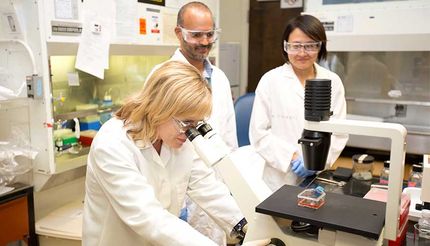Laboratory launches Hepatitis C database
University of California scientists at Los Alamos National Laboratory recently launched an Internet-based hepatitis C Virus (HCV) genomic sequence database similar to the Laboratory's human immunodeficiency virus (HIV) database. The new database is expected to become an important tool in Hepatitis C research.
Hepatitis C is a blood-borne virus that is transmitted principally via blood transfusions and intravenous drug use. The World Health Organization estimates some 170 million people -- three percent of the world population -- carry HCV, although most are unaware they are infected. Roughly four million people in the United States are infected with the virus. The virus is a major cause of acute hepatitis, cirrhosis of the liver and liver cancer. There is currently no vaccine against Hepatitis C, and although some progress in made in treating it, the currently available treatments are expensive, can cause debilitating side effects, and often are ineffective.
According to Carla Kuiken, Theoretical division staff member and developer of the HCV database, "the database was the result of funding from the National Institutes of Health for us to build a new set of databases based on the Laboratory's HIV databases. The Los Alamos HIV databases have long been an important asset for scientists trying to find new drugs and vaccines against HIV/AIDS. Although Hepatitis C and AIDS are very different diseases, the pathogens causing them have properties in common, so the framework created for HIV could be adapted for HCV. This meant that a HCV database and associated tools could be launched relatively quickly."
The genomic sequence database is the first of two new HCV databases to be made publicly accessible. Work has started on the HCV immunology database, which will become available in 2004. The databases share tools and analysis programs with HIV, and future tools will be developed in conjunction so both databases can profit from new developments.
Through the hepatitis C website (http://hcv.lanl.gov or http://hcv-db.org), the database can be searched on several fields. Background information in the database includes health and treatment information, epidemiological information about the date and place of sampling and of infection, genotype and subtype information, publication information and the location of each sequence on the HCV genome. Patient privacy is protected as the information in the database cannot be linked to a specific individual, while science is served as HCV biologists can readily compare their new data and new studies to previously published global data. In addition, the website offers a large number of tools and analysis programs, most of which were developed by the Los Alamos database groups.
Topics
Organizations
Other news from the department science

Get the life science industry in your inbox
By submitting this form you agree that LUMITOS AG will send you the newsletter(s) selected above by email. Your data will not be passed on to third parties. Your data will be stored and processed in accordance with our data protection regulations. LUMITOS may contact you by email for the purpose of advertising or market and opinion surveys. You can revoke your consent at any time without giving reasons to LUMITOS AG, Ernst-Augustin-Str. 2, 12489 Berlin, Germany or by e-mail at revoke@lumitos.com with effect for the future. In addition, each email contains a link to unsubscribe from the corresponding newsletter.



















































